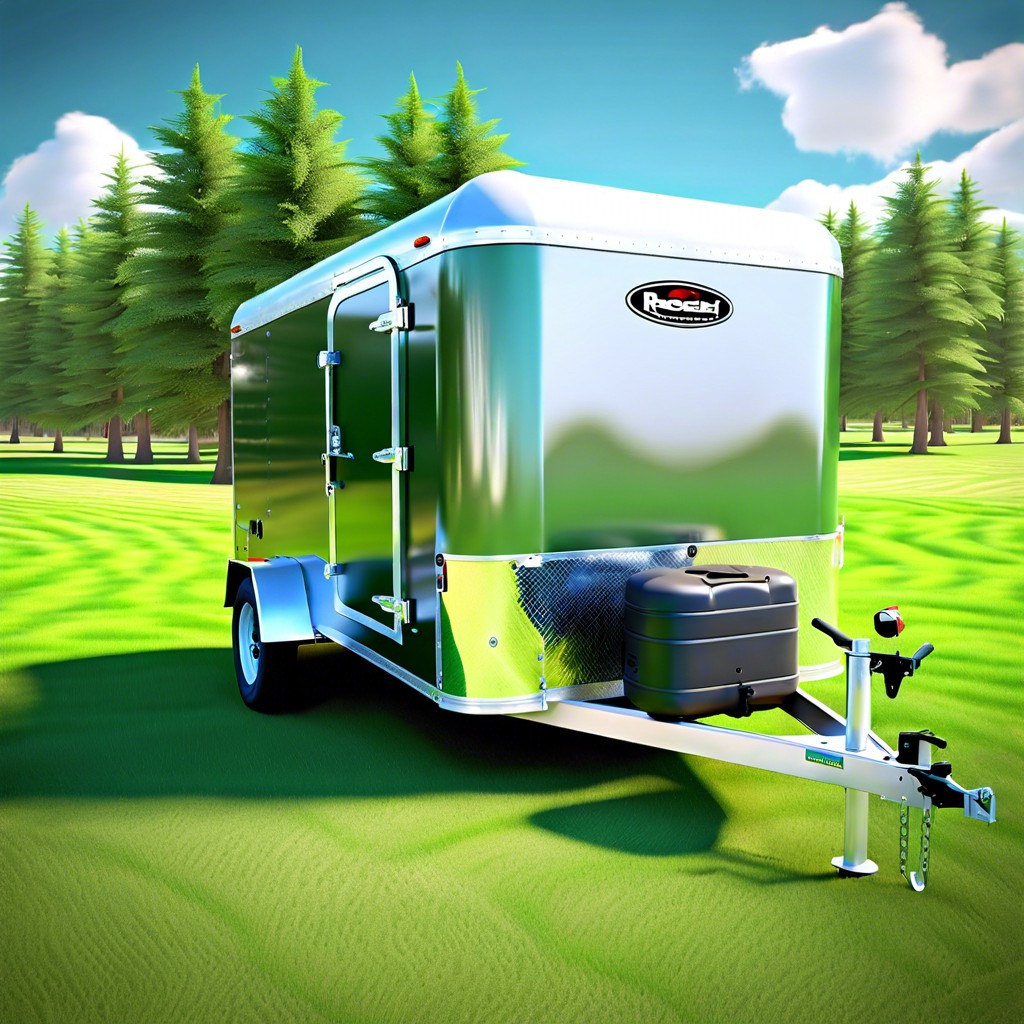Welcome to our comprehensive buying guide on utility trailers, where we will help you understand the key features, types, and considerations to make the best purchase for your hauling needs.
Key takeaways:
- Utility trailers are versatile solutions for hauling various cargo.
- Types include open, enclosed, specialized, removable sided, and folding trailers.
- Consider primary use, weight capacity, material, towing vehicle, and hitch type when choosing.
- Safety measures include proper hitching, tire maintenance, load distribution, and regular checks.
- Cost considerations include initial purchase, resale value, accessories, ongoing ownership costs, and utility value.
About Utility Trailers

Utility trailers are versatile and practical solutions designed for hauling various types of cargo behind a vehicle. These trailers come in different sizes and configurations to accommodate a wide range of tasks, from moving furniture and landscaping materials to transporting ATVs or motorcycles. Typically, they have an open-top, allowing for easy loading and unloading of goods. Some models include built-in ramps, tie-down points, and sides to secure the cargo during transit effectively. The construction material for these trailers varies, with options such as aluminum and steel, catering to different durability and weight requirements. They attach to a vehicle through a hitch, and it’s important to match the towing capacity of your vehicle with the load capacity of the trailer to ensure a safe towing experience. Utility trailers are an indispensable tool for personal use, businesses, or anyone needing an extra space to move materials or equipment.
Types of Utility Trailers
Utility trailers come in a variety of designs, each tailored to serve specific needs from hauling furniture to transporting heavy machinery. The most common types include open trailers, which are characterized by their flatbed design with no sides or a short railing, allowing for easy loading and unloading of large items. These are ideal for transporting landscaping equipment or bulky items that do not require protection from the elements.
Enclosed trailers, on the other hand, offer a secure, weather-resistant environment for your goods. They are preferable when you need to shield your cargo from harsh weather, dust, or potential theft – perfect for moving household items or carrying merchandise to events.
Specialized trailers are built for specific purposes, such as car haulers designed to transport vehicles, or boat trailers for marine craft. They often come with built-in ramps, tie-downs, and other features that make them suitable for carrying specific types of loads.
For those with needs that fall in between, utility trailers with removable sides provide versatility. You can adapt them according to the load size for added convenience. Lastly, folding trailers are a space-saving solution for occasional users who don’t want the trailer to take up a lot of room when not in use.
When considering the types of utility trailers, it’s essential to think about what you’ll be hauling, the conditions you’ll be facing, and how often you’ll use the trailer. Each type has its unique advantages, ensuring that there is a suitable option for every task.
Choosing the Right Utility Trailer
Identifying the appropriate utility trailer for your needs involves several important considerations. Start by assessing the primary use for the trailer, whether it’s for hauling equipment, moving furniture, landscaping, or other tasks. This will determine the size and type of trailer you require.
Next, look at the weight capacity. Every trailer has a maximum weight limit, also known as Gross Vehicle Weight Rating (GVWR), which includes the weight of the trailer itself plus its cargo. It’s important to choose one that can handle more than your estimated load to ensure safety and longevity.
Another crucial factor is the material the trailer is made of. Steel trailers are sturdy and often less expensive, but they can be heavy and prone to rust. Aluminum trailers are lighter and resistant to corrosion but typically come with a higher price tag.
Consider the towing vehicle, as well. Ensure that your car or truck can safely tow the trailer you choose. Check the towing capacity of your vehicle, which can be found in the owner’s manual or manufacturer’s website, and make sure it aligns with your trailer selection.
Don’t overlook the hitch type; it should be compatible with your vehicle’s towing setup. There are different hitch classes, and using the correct one is imperative for the safety of your towing experience.
Lastly, factor in additional features such as trailer brakes, which are necessary for heavier loads, the type of loading mechanism (such as ramp or tilt), and the presence of tie-downs to secure your cargo. Personal preferences like ease of storage and maintenance should also play a role in your decision-making process.
Keep these points in mind, and you’ll be well-equipped to select the optimum utility trailer that aligns with both your requirements and your vehicle’s capabilities.
Utility Trailer Safety Considerations
Ensuring the safety of both the driver and others on the road is paramount when using a utility trailer. To start, always verify that your trailer is properly hitched to the towing vehicle with the correct type of hitch and that the safety chains are securely fastened. These chains serve as a backup connection should the primary hitch fail.
Before embarking on a journey, inspect the tires for appropriate pressure and signs of wear. Tires that are not adequately inflated or are worn down can lead to blowouts and loss of control. The lighting system, including brake lights, turn signals, and reflectors, must be fully operational to communicate with other drivers and maintain visibility, particularly during night-time travel or in poor weather conditions.
Load distribution is also critical. Aim to evenly distribute weight across the trailer bed to avoid imbalances that could cause the trailer to sway or tip. Heavy items should be placed low and near the axle, with lighter items on top or towards the front. Securing all items with straps or nets prevents them from shifting or falling out during transport.
Regular maintenance checks can’t be overlooked. Regularly inspect the brake system, bearings, and suspension system for wear and ensure they are in good working condition.
Remember to account for the increased stopping distance when towing a utility trailer. Drive at a moderate speed and allow for extra space between your vehicle and the one ahead of you. Sharp turns and abrupt maneuvers should be avoided to prevent the trailer from jackknifing or flipping.
Lastly, always adhere to local towing laws and regulations which include speed limits, trailer size limitations, and necessary permits. Safe towing practices protect you and other road users, ensuring a smoother and worry-free journey.
Cost Expectations and Value
When budgeting for a utility trailer, initial purchase price is just the first consideration. Quality often correlates with cost, so investing in a higher-grade model can save money long term due to lower maintenance. Prices vary widely based on size, material, and brand. Smaller, simple trailers may start around a few hundred dollars, while larger, specialized ones can cost several thousand.
Resale value is another factor. Well-known brands and durable construction materials can maintain value better than lesser-known counterparts. Some materials, like aluminum, may cost more upfront but could offer better longevity and resale value compared to steel, which is more susceptible to rust.
Don’t forget to factor in the cost of accessories and modifications, such as spare tires, tarp covers, or ramps, which add utility but also additional cost. Similarly, consider the ongoing costs of ownership, including registration, insurance, and periodic maintenance, which can vary by location and usage.
Finally, the value a trailer offers depends on utility—how much use and function you’ll get out of it. For frequent movers, landscapers, or ATV enthusiasts, a trailer’s cost is easily justified. For occasional users, renting may be a more cost-effective solution. Balancing cost against needs ensures you find a utility trailer that offers the best long-term value for your specific situation.




